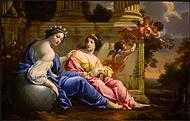
ENGLISH 222: Women and Literature--"Women and Inspiration"

The Muses Urania and Calliope, c. 1634
Simon Vouet, French, 1590-1649
From the Samuel H. Kress Collection, The National Gallery of Art
Urania, muse of astronomy, and Calliope, muse of epic and history, and the winged infant messengers carrying the wreaths which will crown the heads of victorious mortals they inspire.
Spring 2000
Instructor: Arnie Sanders
Department of English
Goucher College
NB: The most recent changes were made on
4/23/00: comments on the tales in "American
Translation" and "Queen
Mother" tale groups. In the second group, please check out the last comment
on "Two Tickets" and its version of one of Marie's Breton lais so you
can let me know which version of Tan's composing process you find most satisfying.
Also, I hope you'll continue to visit the public folder and to share your evolving
final paper ideas with us there. Remember, it's never too soon to start!
Course Description
The
course will explore the relationship between mental/spiritual experiences described as
"inspiration" and the production of literature, especially the historical
changes in women's inspirational processes and the current states of our own creativity.
The class will be multi-dimensional, occurring in regular class meetings, public folder
and web-page creation, journal and formal paper writing, as well as other forms of
interpreted performed creative behavior that can be made relevant to the course. All
students will keep a reflective journal in which they will record and examine their
attempts at creative behavior, whether writing papers, making music or visual arts,
acting, etc. The journals may be illustrated. They will be collected for evaluation and
response four times during the semester. Interpreted performances can include examples of
so-called "creative writing" (fiction, drama and poetry), drawing, painting,
sculpture, dance, athletics (when creative rather than repetitive), singing or
instrumental performance, etc. The examples of performances should be posted to public
folders (when images or text) or installed on web pages linked to this English 222 site.
In all cases, the author/performer must explain its relevance to the course as an instance
in which something new and unexpected happened in those processes, or as an instance in
which the author/performer discovered something significant about those processes.
Our goal is to learn what others have thought about the process of inspiration, as well as
to discover more about how it works in our own lives. For more specific guidance
about the readings and investigative method we will pursue, read the "Historical
Overview of Our Topic" below.